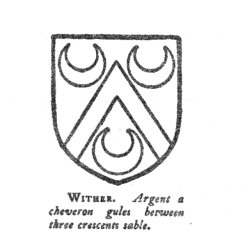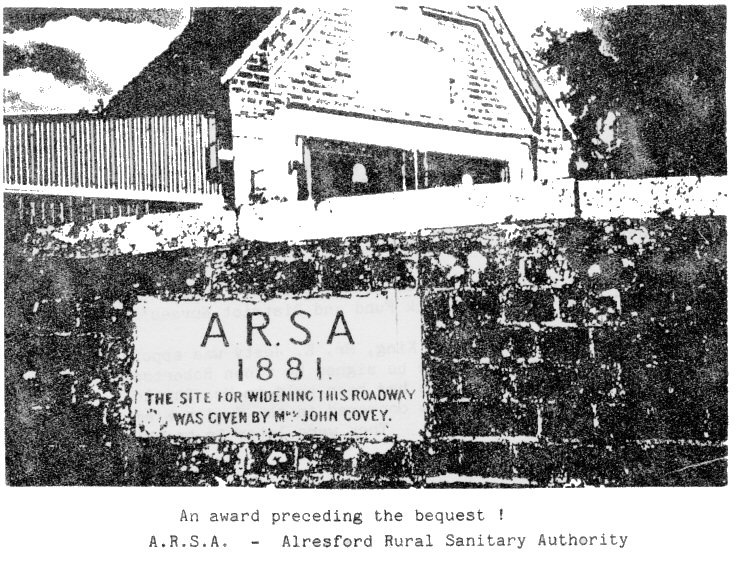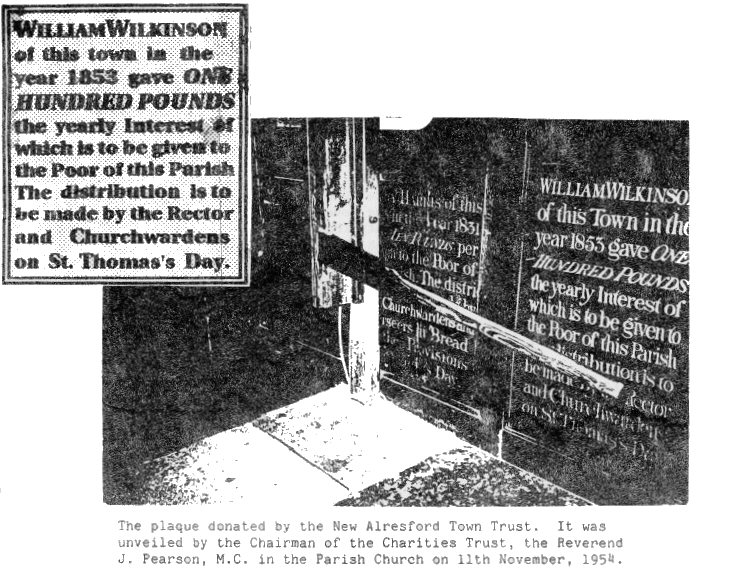No.89 THE NEW ALRESFORD UNITED CHARITIES TRUST
by John Adams
Author's note. After writing Paper No. 33» The Vagrancy Problem in Alresford, the writer was forced to revise the impression he received during his schooldays that in years gone by no-one eared about the poor and unfortunate in the community. Local authorities did care i after twenty years as a Trustee of this Charity he has realised that quite a few individuals cared also : and, what is more, tried to do something about it both as benefactors and administrators. This second paper reinforces his views.
At the turn of the century there were eight bequests from different individuals which were all concerned with the poor and needy of the district. There were and are others, of course, usually aimed at specific targets such as Henry Perin's provision for boys, who would normally be unable to attend, to become pupils of the Grammar School.
The eight bequests (see chart) were administered by various trustees as separate charities. As the real value of money declined, so the yield in interest followed suit and the sums realised became so small that the whole procedure of allocating benefits became cumbersome and time-wasting.
At the end of the First World War the Charity Commissioners, as the final arbiters for all the country's charities let it be known that they would view with favour proposals to combine some of the smaller ones into a larger unit. After consultation arid general agreement by all concerned the Commissioners were approached. After being told that the gross income for the previous year of all the bequests combined amounted to £50 - l6/- Od., they approved the formation of a combined charity on 2nd October 1923. (By the December 1992 meeting the total amounted to £170.00., still a small amount for what was now six charities).
Some suggestions for the name of the Charity were discussed until the one adopted forms the title of this paper.
The Appointees to the new trust consisted of :
| One ex-officio Trustee | The Rector of New Alresford |
| Four Representative Trustees | two appointed by the New Alresford Parish Council and two by the New Alresford Town Trust. |
| The Clerk to the Trust |
The Trust wasted no time in holding its first meeting on 13th December 1923. This was a long meeting at which the whole organisation was set up. The ex-officio Trustee was the Reverend W.E. Colchester : the others being Dr. Hodgson, J. Ridley Shield, the Reverend T.R. Archer and Geo. Payne. The Clerk, without salary, was Edmund King.
| Date of bequest | Testator | Terms of benefaction |
| C.1670 | William Pink, formerly a poor vagrant | £20 to the Parish Officers of New Alresford, the interest of which was to be paid yearly for ever to the poor of the town on St. Thomas' Day. |
| 1680 | James Withers, tradesman | £20 to the Bailiff of the Borough, the interest of which yearly for ever was to be distributed by the Bailiff for the time being amongst poor widows and widowers of the town on St. Thomas' Day. |
| 1681 | William Todd, gentleman | An annuity or rent-charge of £3 a year to be distributed every year on Good Friday in the church porch of New Alresford, immediately after Morning Prayer, amongst such of the inhabitants as did not receive weekly alms of the town. |
| 1833 | Jenny Harris, relict of William Harris, Esq, of this town | An annuity in trust of £10 a year to be distributed for ever on New Year's Day in bread or other provisions by the Churchwardens and Overseers. |
| 1853 | William Wilkinson | A sum of money for the benefit of the poor of the parish |
| 1862 | John Dunn | A sum of money for the benefit of the poor of the parish. |
| 1882 | Christopher Cooke | A sum of money for the benefit of the poor of the parish and :i in every year in which the 26th day of June falls on a Sunday, out of the income of this Charity the sum of £1 shall be paid to the Minister who shall deliver a sermon on that day from one of the Ten Commandments or a text in the Parish of New Alresford. |
| 1885 | Susanna Eliza Covey | A sum of money for the benefit of the poor of the parish. |
| NOTES:- | (a) | With regard to the first two bequests,
it appears that eventually one £20
purchased a house in the Dean, "now
used as a poor house, and one acre
of land in the Common Fields now called
the Town Acre, on part of which now
stands the Pest House" : the other £20
being used to purchase four acres of
land in the Marsh : for each of which 20/- a year was distributed amongst the poor. |
| (b) | That of the third testator, William Todd; it was recorded that he charged five acres of land in Brook Furlong and two acres of land in the Marsh with the payment thereof forever s "this sum was constantly distributed amongst the poor every year on Good Friday by the Overseers", | |
| (c) | The date specified in Cooke's bequest fell in 1991*. The Rector of the United Benefice, the Reverend Graham Trasler, told the writer that one of his Churchwardens had asked him if he intended to claim the bequest. However, he, the Rector, would be away in Edinburgh on that day anyway. To his knowledge no one had benefited from the bequest during the period of his incumbency, but the Churchwarden's enquiry showed that it had not been forgotten! | |
| (d) | The Withers and Covey bequests were treated as semi-autonomous trusts directed towards particular beneficiaries. It is hoped to publish a separate paper on these at a later date. |

It was resolved that meetings should be held on the last Thursday in each month at 5.30 p.m. Meetings would be convened if there was no business to discuss. In the event, after the Trust was firmly established, meetings were held less frequently until it was found that an annual meeting in December sufficed to cater for all purposes.
At the first meeting the National Provincial and Union Bank of England Ltd., (forerunners of our bank in East Street) acted as bankers for the Trust. It was agreed that the Withers bequest to widows and widowers should be awarded to 23 people, each receiving 5/-, and that this arrangement was to be authorised at each December meeting. Other grants were made for particular purposes. These included 307- for surgical appliances for a sick child ; 407- for the New Alresford Coal Club and 407- for the Boot and Clothing Club. Afterwards it was agreed that the Withers bequest should be continued as a separate fund contained in the main account and later the Covey bequest was treated similarly.
A sub-committee was set up to deal with sudden emergencies consisting at first of Dr. Hodges and J. Ridley Shield.
It was agreed that the Clerk would be provided with forms of application for grants and a book of tickets printed. The tickets, worth 57- each, were for the purchase of food and fuel and medical appliances (e.g. spectacles).
Mr. Shield acted as whom we would now call Hon: Treasurer.
Thereafter applications for grants and the issue of tickets took place at the end of each meeting. Funds issued were subject to an agreement that the amount remaining in the bank account must not fall below £20.0.0.
Some applicants who were receiving Poor Law Relief were refused a ticket.
Finally, it was agreed that the Chairman of each meeting would be elected from those present at the opening of the meeting.
Points from subsequent meetings may be of interest :
Mr. Geo. Payne appeared for the first time (he had been very ill : he died during the following year).
The Reverend (later Canon) A.J. Robertson succeeded the Reverend W.E. Colchester.
Alresford Provident Club, run by Miss M. Baker, was taken over by the Trust.
An annual subscription of two guineas to the Alresford District Nurse Fund was authorised.
The Reverend Archer and Mr. Payne had by now been succeeded by Mr. E. Jesty and Mr. H.J. Phair. The Trustees were now, except for one change, to remain the same until 1938 following the death of Mr. J. Ridley Shield. The tickets authorised at the first meeting were now to be known as vouchers. At this meeting it was reported that the current account now totalled £35 - 4/- -8d (this was in addition to the stock balance, as the reserve was now called, of £20.0.0.)
At the end of the 1920s, because of the approaching depression the financial situation of the Trust became critical. The rapidly growing unemployment situation made great demands on available funds. The Trustees were conscious that their capital had to be preserved and hoped that it would not be nibbled away by outside forces over which they had no control. Each application for help was carefully and lengthily considered before a decision was made : the regular awards established during the early days of the

Trust we kept up, albeit with much anxiety. Indeed, in December 1927 the annual subscription which by now was being sent to the Royal Hampshire County Hospital was raised from two to three guineas and a Mr. Spreadbury of Spring Gardens was awarded half the cost of a set of dentures up to a maximum of £3-0.0. By the time of the December 1929 meeting it appeared that the whole world was in a financial mess : the decision was taken that any one Trustee could deal with a request for help immediately and report on the action taken at the next meeting.
By December 1930 a new system had been introduced whereby tradesmen were being refunded outstanding bills for food and clothing for those unable to pay. Grants for clothes and "necessaries" were now being made to pupils of Perin's School. Dr. Meryon succeeded Dr. Hodgson due to the illness of the latter.
An eleven year old girl from Kingsley Bungalows, Alresford, was being treated in the Bonchurch Benevolent Home. In July, 1931 the Trust made a grant of 3 guineas to the Home and this continued for some years. At the end of the year, in December, 10/~ was awarded to the Council School Cocoa Fund and the 5/- vouchers were still being issued but to fewer applicants. In December, 1932 the sum of £1 - 5/~ Od. was given to the Council School Milk Fund. It appears that anonymous donations were being received during this grim recession period and a few of the recipients of the Withers bequest had their vouchers increased from 5/- to 10/- in value. With a few exceptions, meetings were now taking place as a regular December affair.
Moving on to :
A new (unspecified) type of grant was introduced under which a Miss Gunner was awarded £2 - 10/- Od. for tuition fees. The School Milk Fund was now in receipt of £3.0.0. per annum.
Mr. J.A. Monck succeeded Mr. J. Ridley Shield. Small increases were now made to the Hospital, Milk Fund and District Nurses' grants.
After the resignation of Mr. King, Mr. E. Jesty was appointed Clerk in 1939- Cheques would now be signed by Canon Robertson and Mr. Jesty. Up to now meetings had been held in Mr. Shield's office in East Street but were now convened in the Junior Elementary School or the Rectory in Sun Lane. They were later to be held in the home of a Trustee or the Clerk.
The Reverend E. Nicholl became a Trustee after the death of Canon Robertson. The annual subscriptions to the bodies mentioned above were continuing although some had been reduced in amount. In
December all the Withers bequest vouchers were raised in value to 10/-.
Following the Beveridge Report, and the forming of the National Health and Social Services in the late 1940s, the Trust, which in December, 1944 was administered by the Reverend Nicholl, Dr. Meryon, Mrs. Hankin, Mr. C. Asher and Mr. Jesty found their work changing in nature and direction. The Trustees themselves changed more often, too, and Mr. A.H. White, Mr. E.E. Witchard and the Reverend J. Pearson, M.C. all took their turn. A minor crisis occurred in 1946 and 194? when the annual distribution of vouchers had to be carried out by post due to the illness of the Trustees. In fact, there are no recorded minutes for 1946, so it looks as if the whole body, including the Clerk, was indisposed at that time.
At the December 1948 meeting the question of discontinuing the donations to the Royal Hampshire County Hospital and the Alresford District Nurse Fund was raised. No decision was made and the item was held over but it seems probable that with the State taking over, these were dropped when the bodies were incorporated into the system.
At the December 1950 meeting, the Reverend Pearson (in the Chair) was provided with £5.0.0. for arranging a Christmas party for residents aged 65 and upwards, each of whom was given a voucher worth 12/-6d. This Old Folks party was to continue for many years and formed the nucleus and origins of what was to become the Alresford Over 60s Club. The Rector also obtained funds to purchase vests for six children from two families.
This meeting marked the beginning of a harrowing period for the Trustees. The setting up by the State of such a huge organisation as the "welfare state" posed many problems which had their repercussions on charities of this type. The Alresford Union had closed in the mid-thirties and re-opened in 1949 as the Tichborne Down House Hospital for the mentally retarded. The Trustees sometimes found it difficult to decide where the responsibilities of the State ended and theirs began. Some cases of hardship seemed not to be covered by either. However, with their limited funds they did their best. By the July, 1955 meeting the Chairman (Dr. Leishman) was able to suggest to the others that the Christmas party, perhaps, together with the gifts which had also been introduced, might be unnecessary as the rates of Old Age pensions and National Assistance grants possibly made pensioners, in the main, more comfortable than they had been hitherto. Thus the limited funds of the Trust could be channelled to those in very real need. Eventually at the November 1955 meeting it was agreed to put in hand a general scaling down of grants where, especially, the State could provide suitable alternatives.

By now, both the Parish Council and the Town Trust were making a regular practice of each appointing a local doctor as their Representative Trustee. The doctors' specialist knowledge of their patients and advice were of great value to the remainder when a difficult decision had to be made regarding an award. The Trustees main business now gradually developed into the gifts of useful items at Christmas (usually about five or six persons suggested by the doctors). Cash or coal vouchers still being issued were limited in the sixties to £1.0.0. and gradually were discontinued except in extreme cases as time went on, until latterly a more valuable award would be made in cash or kind.
A search had been going on for many years for a copy of the original Scheme of 1923, issued by the Charity Commissioners, with no success. In December 1962 it was announced that the search would be abandoned and it was concluded that the original Trustees had kept their copies which would have been lost or thrown away.
In more recent years money available, apart from the Christmas gifts, has been allocated mainly to the Community Care and Age Concern appeals.
The Charities Act, 1992, was a formidable piece of legislation which has taken two years to reach the Statute Book, It looked at all aspects of all charities and received general support from all the political parties. Its passage through the legislature, by means of "parcels" of its many clauses, was accompanied by advice from Government legal advisers as its various sections became law. This very useful advice, in the form of printed pamphlets,persuaded our Trustees that the sensible course for them might be to seek absorption of the Trust by the New Alresford Town Trust. Accordingly after the December 1992 meeting negotiations were set in motion in a first approach by the Reverend G. Trasler to the Town Trust to seek their co-operation.
Since then the writer has been informed by Mr. D. Darney, the present Clerk, that the Charity Commissioners have refused permission for the Town Trust to administer the affairs of the Charities Trust. Other plans have therefore to be discussed and the outcome will be awaited with interest.
(C) John Adams, October 1994.
Sources :
Minutes and Account Books of the N.A.U.C.T.
Minutes and Account Book of the New Alresford Bailiff and
Burgesses (see Paper No. 59)
The Reverend Graham Trasler
History of Alresford : A.J. Robertson : 1937 (reprinted by
Laurence Oxley 1969).
The writer wishes to express his thanks to Mr. D. Darney for his unstinted co-operation in allowing him access to the Minutes and Account Books of the Trust. I also wish to thank my colleagues on the Board, especially the Doctor members, during my twenty years as a Trustee. Simply by listening to them I learnt a great deal about the problems, and solutions arrived at, of those who needed help.